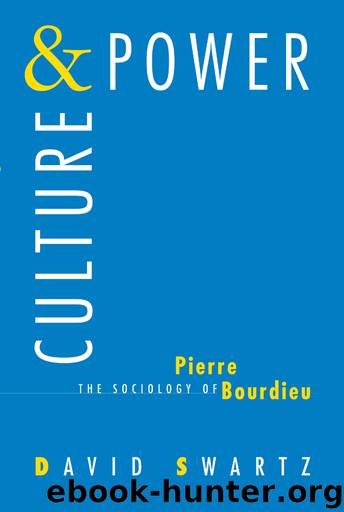Culture and Power by Swartz David

Author:Swartz, David [Swartz, David]
Language: eng
Format: epub
Publisher: The University of Chicago Press
Published: 2012-07-04T16:00:00+00:00
8
EDUCATION, CULTURE, AND SOCIAL INEQUALITY
Education occupies a central place in Bourdieu’s work. His concern with exploring the intimate connections between class, culture, and power in modern stratified societies ultimately leads him to study educational institutions. Pursuing his central theme of the importance of culture in social stratification, Bourdieu sees the educational system as the principal institution controlling the allocation of status and privilege in contemporary societies. Schools offer the primary institutional setting for the production, transmission, and accumulation of the various forms of cultural capital. More importantly for Bourdieu, schools inculcate the dominant systems of classification through which symbolic power is expressed. 1 Moreover, schools are the key institutional base for the symbolic work of intellectuals.
Bourdieu (1982) explains in his Collège de France inaugural lecture that the field of education—as well as the study of intellectuals—receives “primordial status” in his work because it gives insight into the unconscious categories of thought that shape the dominant modes of understanding the modern world. Thus, for Bourdieu, the sociology of education is not a subspeciality of sociology but rather the foundation for a sociology of symbolic power. 2 Indeed, it is no exaggeration to say that, with the exception of his anthropological work, virtually all of Bourdieu’s investigations of French society connect with some aspect of French education. 3
Bourdieu was one of the first sociologists to take a critical look at the popular post-World War II public policies of expanding educational opportunity in order to reduce social inequality. Though educational levels in all Western democracies have seen tremendous improvement during the last forty years, glaring inequities in wealth, income, and status persist. Bourdieu argues that education actually contributes to the maintenance of an inegalitarian social system by allowing inherited cultural differences to shape academic achievement and occupational attainment. One of Bourdieu’s first works on French education, The Inheritors (Bourdieu and Passeron 1979), documents the persistent overrepresentation of middle- and upper-class students in French universities despite years of education expansion. In subsequent work, Bourdieu consistently emphasizes the socially stratified character of French education.
As I point out in the beginning of this book, a key question animating Bourdieu’s work is, how do inequalities of privilege and power persist intergenerationally without conscious recognition and public resistance? The answer, he contends, can be found by exploring how cultural resources—especially educational credentials, selection mechanisms, and cognitive classifications—can be used by individuals and groups to perpetuate their positions of privilege and power. Bourdieu maintains that the educational system—more than the family, church, or business firm—has become the institution most responsible for the transmission of social inequality in modern societies. The task of the sociologist, therefore, is to “determine the contribution made by the educational system to the reproduction of the structure of power relationship and symbolic relationships between social classes” (Bourdieu 1973a:71).
The education system, Bourdieu argues in Reproduction (Bourdieu and Passeron 1977:177–219), performs three central functions. It first of all performs the “function of conserving, inculcating and consecrating” a cultural heritage. This is its “internal” and most “essential function.”
Download
This site does not store any files on its server. We only index and link to content provided by other sites. Please contact the content providers to delete copyright contents if any and email us, we'll remove relevant links or contents immediately.
The remains of the day by Kazuo Ishiguro(8956)
Tools of Titans by Timothy Ferriss(8354)
Giovanni's Room by James Baldwin(7307)
The Black Swan by Nassim Nicholas Taleb(7092)
Inner Engineering: A Yogi's Guide to Joy by Sadhguru(6779)
The Way of Zen by Alan W. Watts(6583)
Asking the Right Questions: A Guide to Critical Thinking by M. Neil Browne & Stuart M. Keeley(5745)
The Power of Now: A Guide to Spiritual Enlightenment by Eckhart Tolle(5735)
The Six Wives Of Henry VIII (WOMEN IN HISTORY) by Fraser Antonia(5490)
Astrophysics for People in a Hurry by Neil DeGrasse Tyson(5171)
Housekeeping by Marilynne Robinson(4428)
12 Rules for Life by Jordan B. Peterson(4293)
Double Down (Diary of a Wimpy Kid Book 11) by Jeff Kinney(4254)
The Ethical Slut by Janet W. Hardy(4234)
Skin in the Game by Nassim Nicholas Taleb(4228)
Ikigai by Héctor García & Francesc Miralles(4226)
The Art of Happiness by The Dalai Lama(4117)
Skin in the Game: Hidden Asymmetries in Daily Life by Nassim Nicholas Taleb(3983)
Walking by Henry David Thoreau(3941)
